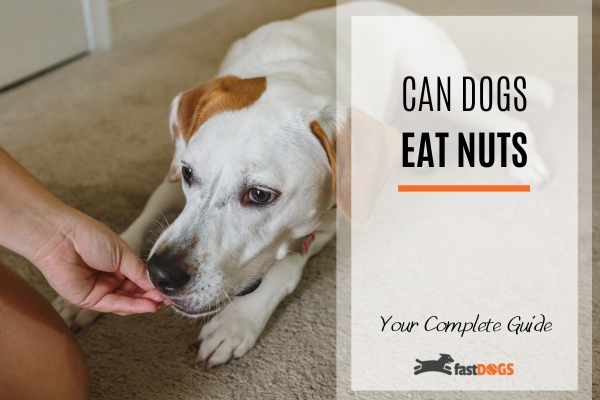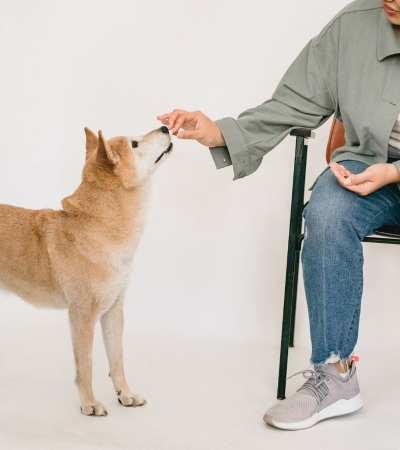Can Dogs Eat Nuts?

If you're a nut lover and a pet parent, you may be wondering — can dogs eat nuts? However, before you offer your dog a handful of peanuts, cashews, or pecans, it's important to know which ones are safe and which ones are not.
Providing your dog with a diverse range of treats can help them meet their nutritional needs and keep them mentally stimulated as they age. Nuts provide beneficial oils, fats, and essential vitamins and minerals such as vitamin B6, copper, and potassium. But are they safe for dogs? Let's find out.We'll dive into the world of canine nutrition and explore whether tomatoes are a suitable addition to your dog's diet. So, grab a coffee, and let's get started!
Can Dogs Eat Nuts? Contents

Can Dogs Have Nuts?
The topic of whether or not dogs can eat nuts is not a straightforward one. The term "nuts" refers to a category of foods, rather than a specific type of food. And, some nuts may provide health benefits for dogs, such as being a source of protein or healthy fats, while others are actually toxic to them.
In short — certain nuts may be safe for dogs to consume, while others aren’t.
Are Nuts Bad for Dogs?
Let’s talk about the downsides first.
While a delicious and healthy snack for humans, when it comes to dogs, various nuts can be harmful to dogs. Here are a few reasons why:Mycotoxins
One of the biggest risks associated with dogs eating nuts is the potential presence of mycotoxins — toxic substances produced by mold. For example, aflatoxin is a mycotoxin that comes from Aspergillus mold.
Mycotoxins can affect many types of food, but nuts and spices are particularly vulnerable due to their long storage periods. These toxins can cause severe reactions in dogs, especially younger or smaller canines. Therefore, it’s crucial to avoid giving your dog nuts or any food with visible mold.
High-Fat Content
Nuts are rich in healthy fats and other nutrients such as omegas, vegetable proteins, and trace minerals, making them a nutritious snack.
But, fat is fat — meaning too much can lead to weight issues over time, while sudden spikes in fat intake can cause inflammation of the pancreas (pancreatitis). To avoid such complications, limit nut intake to one or two per serving and watch for signs of abdominal pain after eating fatty treats.
Calorie-Laden
In addition to their high-fat content, nuts are also high in calories, which can also contribute to obesity in dogs. Obesity can trigger various health problems, such as diabetes, arthritis, high blood pressure, and cancer.
Hence, if your dog is already overweight or borderline obese, it’s best not to share your trail mix with your best friend.
Additives
Store-bought nuts are often coated in various flavors, such as salt, chocolate, or spices. These coatings can pose a more significant threat to a dog's health than the nuts themselves.
For example, chocolate can be poisonous to dogs, while salt can cause urinary stones or high blood pressure. Artificial sweeteners, such as xylitol, can result in a sudden drop in blood sugar and liver failure in large quantities.
To keep your dog safe, stick to plain, unprocessed nuts.

Can Dogs Eat All Types of Nuts?
As mentioned — some nuts are healthy for dogs to eat in moderation, while others can be highly poisonous and cause serious health issues.
So, we’ve put together this list of the most popular nuts to let you know which ones get the thumbs up and which ones to avoid:
Can Dogs Have Peanuts?
While they’re ok, it’s important to take a few precautions to ensure your pup's safety and health.
Since peanuts are fat-dense foods, you’ll want to limit the quantity you offer to your dog — think small portions. Additionally, be mindful of the type of peanuts for dogs you offer. Raw or roasted peanuts without any added salt, spices, or flavoring are the safest options.Is Peanut Butter Safe for Dogs?
Yes and no.
Ensure that it’s unsalted and unsweetened, and be sure to check the ingredients list for xylitol. Remember, this sugar substitute can be extremely harmful to dogs, so steer clear of peanut butter containing this ingredient.
Can Dogs Eat Cashews?
The good news is that cashews are not toxic to dogs.
This means they can eat them without any serious health consequences. However, the fat content issue still applies. So, if you decide to share cashews with your furry friend, do so in moderation.
Cashews mustn’t be mixed with other nuts or contain any flavorings, salt, or spices. These additions might potentially disrupt your dog's digestive tract and produce symptoms like diarrhea, vomiting, and stomach pain.
Additionally, the high salt content in flavored cashews can lead to renal problems and sodium toxicity in dogs. Thus keep to plain, unsalted varieties.
Can Dogs Have Pecans?
Unfortunately, the answer is no.
Pecans can harbor Aspergillus mold, making them unsuitable for canine consumption. What’s more, pecan trees naturally produce the toxin juglone, which can induce seizures and irreversible damage to your dog's neurological system.
In addition to the above, they contain plenty of fats and pose a choking hazard, potentially causing digestive blockages.
All of these factors make pecans a risky snack for dogs, so it's best to steer clear of them altogether.
Can Dogs Eat Chestnuts?
It’s safe for dogs to consume sweet chestnuts. But, keep them to an every-so-often treat. However, horse chestnuts aren’t edible, they’re toxic to dogs. Eating this kind will lead to stomach upset, sickness, or worse.
Furthermore, whole chestnuts can pose a choking hazard, so you must remove the shells and break them up before feeding them to your furry friend.Can Dogs Have Hazelnuts?
No, canines can’t.
While hazelnuts don't contain any toxic substances, their size, and shape could lead to choking and intestinal blockages.
Can Dogs Eat Almonds?
Although almonds are not inherently toxic to dogs, you should still avoid them for several reasons:
- Vulnerable to mold, such as Aspergillus, which includes the poisonous aflatoxin.
- Fat content can cause stomach irritation and digestive problems in dogs.
- Choking hazard — particularly for smaller breeds.
- Highly indigestible — as a result, could lead to gastric issues — gas, diarrhea, vomiting, etc.
Hence, almonds fall into the avoid list.
Can Dogs Eat Almond Butter?
Almond butter, a spread made from ground almonds, is a popular choice for health-conscious humans. But is it safe for dogs to eat? Surprisingly, the answer is generally yes, but with some important caveats.
While almond butter is marginally easier for dogs to digest than the nut itself, it’s super high in fat and calories — heightening the risk of pancreatitis. Additionally, some brands may contain added sugars or artificial sweeteners, which can be harmful to dogs.
To find out more, check out our guide on Can Dogs Eat Almonds?Can Dogs Have Walnuts?
It’s a no.
Dogs shouldn’t eat walnuts, whether they’re English, black, or any other type of walnuts. This nut, like pecans, contains a toxin called juglone, which is naturally produced by walnut trees.
Present in the stems, nuts, and leaves of the tree, juglone poisoning can mean your dog experiences:
- Vomiting.
- Seizures
- Weakness.
- Tremors.
- High temperature.
Additionally, walnuts, especially older ones, might be prone to mold infestation. This can result in the presence of dangerous aflatoxins.
Can Dogs Have Macadamia Nuts?
Never offer macadamia nuts to your dog.
Even a small amount can cause toxicity, which induces vomiting, diarrhea, and in some cases, hind leg paralysis.
If you find your dog has a high fever, is shaking, or having difficulty moving, you should seek veterinary attention right away. These serious symptoms suggest that your dog requires immediate medical assistance.
Keeping macadamia nuts away from your pet is the best approach to avoid potential harm.
Can Dogs Eat Pine Nuts?
No.
Although they may seem like a healthy and tasty treat for our furry friends, pine nuts can be harmful to dogs due to their high-fat content and elevated levels of phosphorus. These factors may lead to the development of kidney stones and urinary tract problems, which can cause discomfort and health complications for our canine companions.
Can Dogs Have Brazil Nuts?
Although all nuts are considered fat-laden, Brazil nuts are on the higher end of the scale. And, despite their nutritional benefits, including being selenium-rich, the fat content far outweighs the benefits.
Can Dogs Have Pistachios?
Unfortunately, pistachios are not recommended for dogs to consume.
Mold contamination is a big worry. Plus, the size of these nuts can pose a choking hazard, and their hard shells can cause stomach obstructions. Therefore, it’s best to keep pistachios away from your furry friend and opt for dog-safe treats instead.

Final Thoughts
As much as we love to spoil our furry friends with treats, it's important to remember that not all human foods are safe for dogs. Nuts, for instance, can be a healthy snack in moderation, but they should be approached with caution. In fact, it's best to consider them as an occasional indulgence rather than a regular part of your dog's diet.
Certain types of nuts can be toxic, like walnuts and macadamias, whereas others can lead to choking or blockages — for example, pistachios. But all nuts contain generous helpings of fat.
So if you’re wondering, can dogs eat nuts? Yes, some are safe for dogs. But given that there are other treats out there that are way better for them, we’d say skip this snack suggestion.Can Dogs Eat Nuts? FAQs
Which Nuts Are Poisonous to Dogs?
Several types of nuts are toxic or potentially harmful to dogs. Here are some of the most common:
Walnut.
Pecans.
Pistachios.
Hickory nuts.
Macadamia nuts.
Is It Safe for Dogs to Eat Nuts?
It may not be the wisest choice.
While some nuts are safe for dogs to consume in small amounts, long-term consumption can lead to obesity and serious health issues. Not to mention the risk of choking. Hence, it’s not recommended to make them a regular part of your dog's diet.
What Is the Best Nut for Dogs?
Cashew nuts are a good choice. But, always opt for raw, roasted, or unsalted cashews to avoid giving your dog too much salt or unhealthy additives.
What Happens if My Dog Accidentally Eats a Nut?
This depends on the type and amount consumed. Macadamias can cause weakness, vomiting, and other severe symptoms. Others result in digestive upset. Contact your veterinarian if your dog has eaten nuts or shows signs of illness.
Keep nuts out of your dog's reach to prevent accidental ingestion.
What Happens if a Dog Eats an Almond?
Almonds pose a potential danger to dogs, particularly in smaller breeds, as they can cause blockages in their esophagus, intestines, or windpipe. These blockages can be deadly if not attended to promptly and may even necessitate surgery.
My Dog Ate Nuts What Should I Do?
The first thing you should do is determine what type of nuts your dog ate. If you suspect that your dog ate a toxic nut, such as macadamias, walnuts, or pecans, you should contact your veterinarian immediately.
